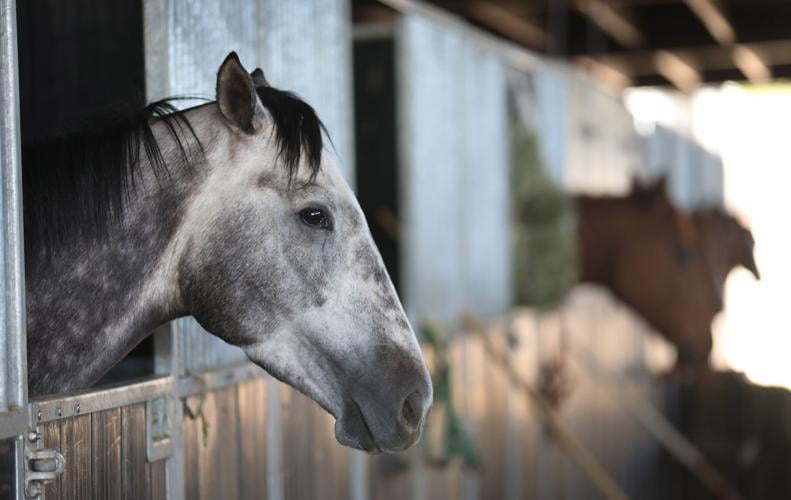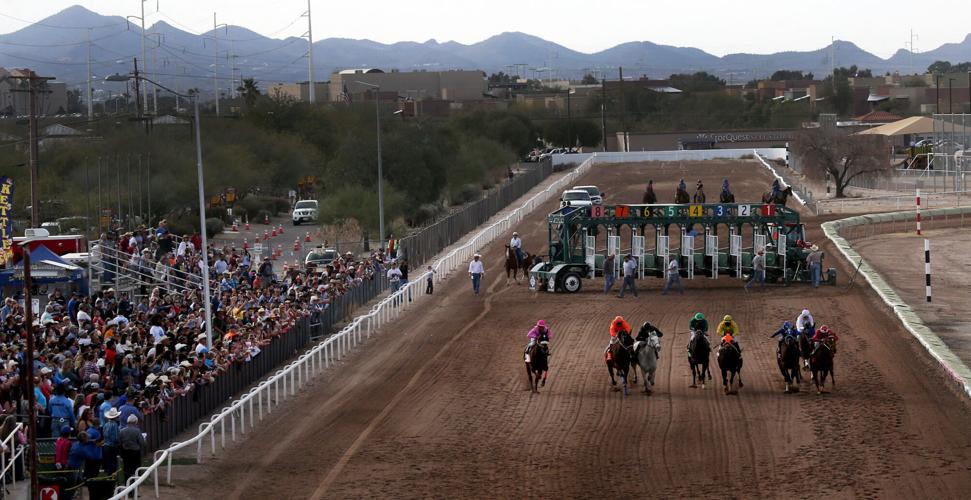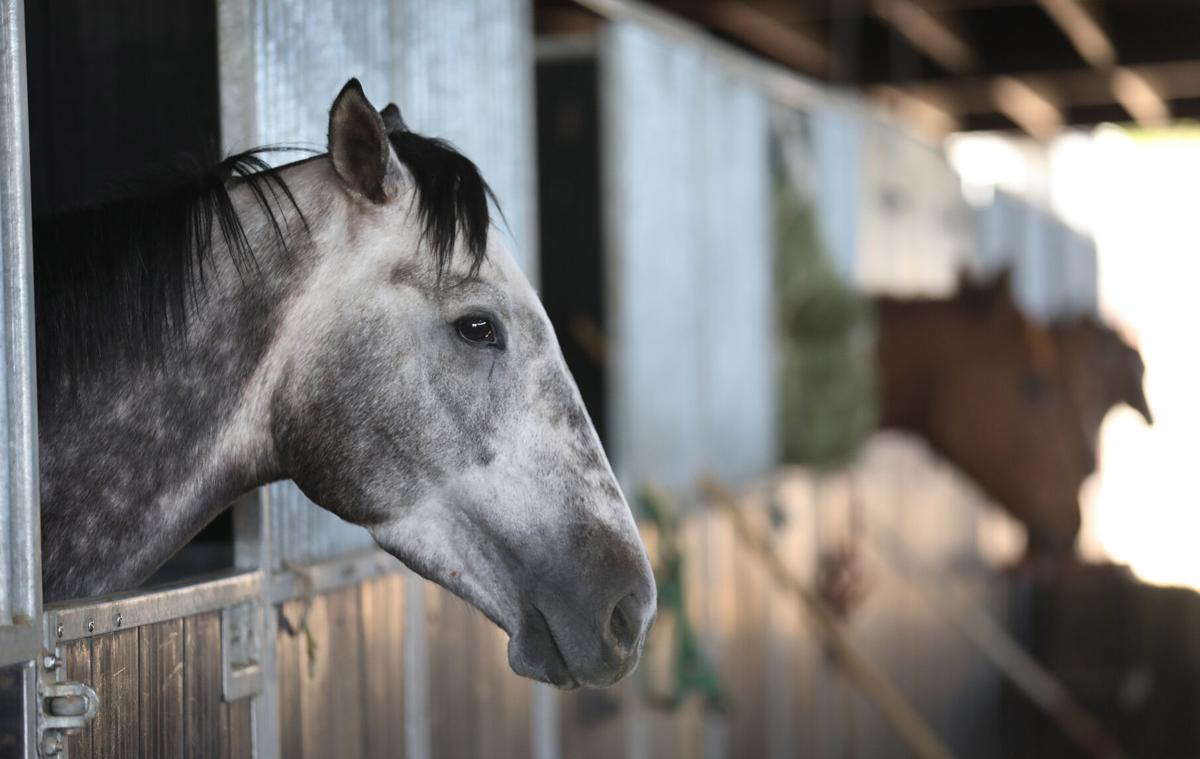Three more horses have died at Rillito Park Racetrack over the last several weeks, bringing the total for the season's first four weeks up to seven.
And although track officials say they're taking extra precautions and pulling more horses from races this season than ever before, the Rillito deaths — plus 24 at Phoenix's Turf Paradise — have led animal rights advocates to call on officials to suspend horse racing in the state.
“Although racing can never be entirely safe for horses, simple changes could prevent countless fatal breakdowns,” Kathy Guillermo, senior vice president for the People for Ethical Treatment of Animal, said in a Friday news release.
Last month, PETA sent a letter to the Arizona Department of Gaming Division of Racing requesting racing be suspended immediately at Turf Paradise until CT scanning equipment is installed to detect pre-existing injuries.
PETA's letter pointed to a study that showed that a high percentage of broken bones in horses are caused by pre-existing conditions, specifically injuries at the site of the break.
The five deaths due to "breakdown" — which in a horse a potentially career-ending injury, typically to its leg — represents 1.09% of the 456 horses entered to race at Rillito between Feb. 26 and March 20, according to information provided by the track.
During the same eight days of racing, 50 horses were "scratched," or pulled from the card prior to racing, said track manager Mike Weiss.
"I don't know about the horse industry, but I do know the team is telling me they're doing everything they can," Rillito Park Foundation President Ed Ackerley said Friday, as track officials were gearing up for the penultimate race weekend of the season. "But one horse dying is too many."
Task force formed
Following the four horse deaths on opening weekend — one was determined to be an accident and a second was the result of a collision between two horses during a race — the foundation announced the creation of a panel of race-industry experts to review cases and make recommendations about how Rillito can make races safer.
Ackerley said Friday the formation of the task force is underway, with the foundation looking to seat one more expert, an out-of-state veterinarian who has written extensively about horse fatalities.
"That's the last piece that's missing, is to get someone that's really an expert to weigh in," Ackerley said. "I've been told contact was made and with that missing piece, we're ready to fly."
Once the task force is official, "they're ready to convene and make it happen," Ackerley said, adding that the Arizona Department of Gaming's chief veterinarian recently told him the track's protocol is excellent and that other tracks in the state should adopt an equine wellness program like the one at Rillito.
The Rillito Park Equine Wellness Program was created several years ago. It quickly set standards of care and monitoring that are now used at many tracks across the country, and includes monitoring of horses by vets and interns and a database of information to help create a profile for each horse that races at Rillito.
"We went with zero incidents the next year," Weiss said of the 2019 racing season, the first under the wellness program. "We had major tracks around the country calling and asking us to tell them what we're doing and show us the systems."
Ackerley said the state's veterinarian told him accidents happen every once in awhile, and the recent spate of deaths at Rillito was "just a confluence of bad luck, perhaps."
Another industry expert also used the word "accident" when referring to the horse deaths at Rillito in a March 16 letter to the editor on racing website The Paulick Report. In her letter, racehorse owner and consultant JoAnn di Filippo said that "while these accidents are never acceptable, they bring out the naysayers who have competing interests over valuable land use.
"It’s a never-ending battle facing stiff opposition from the soccer groups and developers all clamoring to get their hands on this valuable property," Fillippo said of the county-owned land on which Rillito Racetrack resides. She also pointed to Rillito's track as a national model.
"We need to take a close look at how this little community racetrack in Tucson, Arizona, is setting the stage for accountability standards that can be adopted nationally to ensure safety for both the two-and-four legged investments we so thoroughly cherish and protect," Fillippo said.
Weiss was clear that safety comes first at Rillito, but said that despite an extended break between racing seasons, with 2020's being called off midseason and no racing taking place in 2021, this season's kick off was "rushed and last-minute."
The track had planned to have 20 race days this year, up from the usual 12. That would have meant a 10-week racing season. But with the state's Department of Gaming's racing division stretched thin, and with two vacant seats on the five-person commission and a new executive director, that didn't work out, Weiss said.
"We didn't get approved for our permit until eight days before racing season," Weiss said.
A spokesman for Gov. Doug Ducey's office said the governor is hoping to fill the vacant positions as soon as possible and is actively seeking out candidates.
"I believe there was a candidate interviewed this week, in fact, but the position has certain qualifications," said director of communications C.J. Karamargin. "Because of that, the field often narrows and the positions can be hard to fill."
The growing number of horse deaths at both Turf Paradise and Rillito "has not escaped" the governor's attention, Karamargin said.
The bumps in the road for Rillito didn't end with the late inspection by the state. When the state gaming commission increased the prize money at Rillito four-fold this season, up to $100,000 per race day from $25,000 in previous years, Weiss anticipated an increase in entries, ordering 50 extra stalls from a track in Kansas.
As they were being shipped and set to arrive in time for opening day on Feb. 26, the driver experienced a tragedy, resulting in the stalls being delivered weeks late.
Despite the rocky start, the track is setting records in terms of attendance and wagering, Weiss said, adding that one recent race day, $400,000 was wagered on Rillito's races from outside the state.
"The clubhouse is sold out every weekend. People are showing us how much they miss this," he said. "We're sending our signal out and tracks all over the world are watching and wagering on us."

Rillito Racetrack planned to have 20 race days this year, up from the usual 12. But with the state’s Department of Gaming’s racing division stretched thin, and with two vacant seats on the five-person commission and a new executive director, it isn’t happening.
Students are key
When Weiss, who lives in South Florida and comes to Tucson for Rillito's race season, first arrived at the track years ago, he approached the University of Arizona College of Agriculture and Life Sciences to see what kind of relationship it had with the track. When he was told it had none, Weiss offered to hire the school's students as interns.
They've been instrumental in its operation ever since. This season, 23 UA students are assisting Rillito officials with all parts of the business, from hospitality and marketing to racetrack management and veterinary science. Weiss is also an official part of the UA faculty, his title listed as career coordinator and counselor. He has former students all over the country, including one who heads up the Delaware racing commission and another who called last year's Kentucky Derby.
"The students keep me coming back," Weiss said. "I can point at them and show nationwide success."
Weiss said he's been very diligent in trying to keep the equine wellness program going, but coming off a long offseason, it took some time to get fully staffed, especially when it came to hiring the track's three vets.
After the opening weekend deaths, Weiss doubled-down on the program and gave his staff free reign to pull horses from racing if they had any concerns.
"We have vets and student assistants look at them all. They jog each horse and I've told them if they have any doubt at all, scratch them," Weiss said. "We've been scratching more horses this season than ever before."
Weiss said he's been aware of a few people that have tried to enter horses that have perhaps not been sound to race, saying the increase in prize money was a "big jump."
Ackerley said the foundation will do whatever the panel recommends, but it's important to know that they're saving horses already.
The foundation has a program in place that if a vet determines a horse can be rehabilitated from an injury at the track, the foundation will take over caring for the animal and pay for it's food, boarding and rehab.
"That's the commitment I've made and we made," Ackerley said. "If we can save a horse, let's save every horse we can."
Ackerley called the program a significant commitment and a good example of what people can do if they work together.
"I am and always have been diligent that I have to protect these professional athletes. These horses are bred for this," Weiss said. "They are the athletes, but then you have a 115-pound professional athlete steering a 1,200-pound professional athlete in traffic. We do our best to make them safe."
Archive photos: Horse racing at Rillito Park
Horse racing at Rillito Park
Updated
Mud-covered jockeys at the Tucson Turf Club at Rillito Park on Feb. 12, 1968.
J. Rukin Jelks
Updated
J. Rukin Jelks' Rillito Track, about 1944.
Horse racing at Rillito Park
Updated
Snow across the Santa Catalina Mountains as the horses run at Rillito Park in January, 1960.
Horse racing at Rillito Park
Updated
Rillito Park in 1953.
Horse racing at Rillito Park
Updated
Horses racing at Rillito Park in Nov, 1953.
Horse racing at Rillito Park
Updated
Opening day cover treatment for a Tucson Citizen story on horse racing at Rillito Park, ca. 1950s.
Horse racing at Rillito Park
Updated
Undated photo of horses racing at Rillito Park.
Horse racing at Rillito Park
Updated
Undated photo of horses down the stretch at Rillito Park.
Horse racing at Rillito Park
Updated
Jockey Ron Beverly wipes mud from his face after a 350 yard quarter horse race on a very wet track in January, 1992.
Horse racing at Rillito Park
Updated
Horses and jockeys round the final turn at Rillito Park in November, 1988.
Horse racing at Rillito Park
Updated
Chariot races at Rillito Park in 1993, organized by Ty Cobb of Sierra Vista.
Horse racing at Rillito Park
Updated
A close race at the Rillito Downs in November, 1978.
Horse racing at Rillito Park
Updated
This 1978 photo shows the largest crowd in recent years, 3,210, attended opening day at Rillito Downs and saw several close races.
Horse racing at Rillito Park
Updated
Horses spring from the gate at the Tucson Turf Club at Rillito Park in March, 1968.
Horse racing at Rillito Park
Updated
Undated photo of horses at Rillito Park.
Horse racing at Rillito Park
Updated
Horse racing at Rillito Park in 1944, prior to the grandstands.
Horse racing at Rillito Park
Updated
Rillito Park Race Track sign in 1955.
Horse racing at Rillito Park
Updated
Grandstands at Rillito Park in 1955.
Horse racing at Rillito Park
Updated
Rillito Park in 1952.
Horse racing at Rillito Park
Updated
Undated photo of horses down the stretch at Rillito Park. Likely 1950s.






